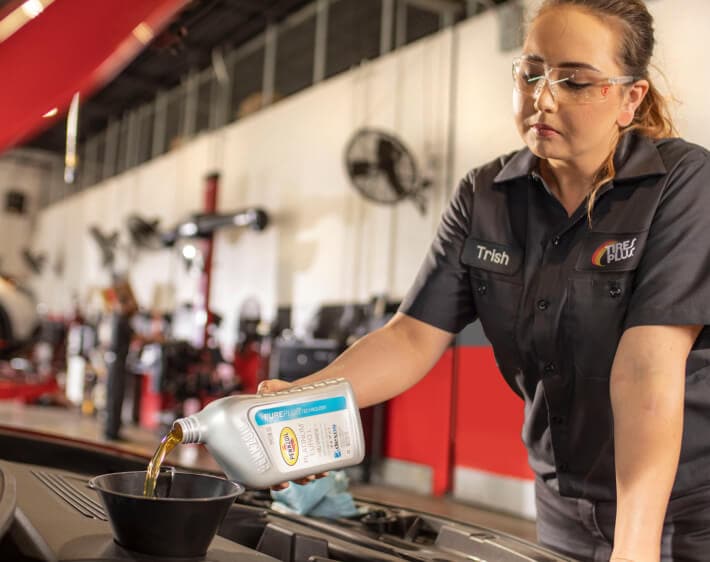Oil changes are vital to your engine's wellbeing. However, not all motor oils are the same. In some cases, synthetic motor oil may be the better choice for your car due to its unique ingredients and benefits.
Here, we'll teach you all about synthetic oil, including how it benefits your vehicle, how often to change it, and why it might be the best oil for your engine.
What Is Synthetic Oil?
As the name suggests, synthetic oil is chemically engineered. Synthetic oil typically starts as crude oil, just as traditional oil does, but it’s highly refined and contains fewer impurities than its conventional counterpart.
Both types of oil serve the same purpose—to lubricate your engine's moving parts.
Is Synthetic Oil Better for Your Car?
Generally speaking, yes. It can be.
In a series of tests, AAA found that synthetic oil performed an average of 47% better than conventional motor oil did.
Because it has fewer impurities than traditional oil, synthetic oil can keep your engine in better shape and help prevent repairs. The key to those benefits is synthetic oil's ability to block more sludge buildup in your engine than conventional oil. It also helps to remove any gunk that’s already in your engine. That's one reason why we only use Pennzoil® synthetic oil. No other leading motor oil helps keep engines cleaner than Pennzoil®.
In addition, the low viscosity (or faster flow) of synthetic oil boosts fuel efficiency because faster-flowing oil enables engine components to work more quickly. The less effort your engine has to put forth to work, the less fuel it uses!
What Cars Should Use Synthetic Oil?
Research by AAA shows that synthetic oil is particularly beneficial for vehicles that:
- Haul heavy loads
- Have turbo-charged engines
- Travel frequently in stop-and-go traffic
- Operate in extreme hot or cold settings
More and more vehicle owners are taking advantage of synthetic oil, too. According to Consumer Reports, a 2018 survey by National Oil and Lube News found that 57% of car owners chose a full synthetic or synthetic blend oil. On the flip side, only 32% of surveyed motorists opted for conventional oil.
Even so, not all engines are equipped for synthetics. Always consult your owner's manual and stick to the manufacturer-recommended oil. Your owner's manual will also include information about how often to change your synthetic oil, if applicable.
Most modern vehicles have oil change intervals from 7,500 to 10,000 miles, notes Car and Driver, which is generally a good timeframe to use if you can't find any information on the interval for your car.
How Much Does a Synthetic Oil Change Cost?
Manufacturing synthetic oil is more complicated than producing conventional oil. So, synthetic oil can be a little more expensive.
However, the price difference isn't as significant as you might think—especially when you consider the potential car repair savings you could enjoy thanks to proper engine maintenance! Add on an oil change coupon or seasonal discount from Tires Plus and you're ready for some serious savings.
Is Synthetic Oil Worth It?
For many car owners, the answer is a resounding "yes.” Synthetic oil is worth it, since:
- Synthetic oil protects your engine better than conventional oil.
- It can last longer than conventional oil, leading to less frequent oil changes.
- It helps maximize fuel economy.
- It could reduce your risk for engine repairs.
If you're still uncertain about synthetic oil, consider this: AAA found that 83% of automotive technicians put synthetic oil in their personal vehicles.
Now that you know why synthetic oil could be better for your engine, don’t let the higher price tag put you off. Talk to a technician before switching to synthetic oil and ask about the latest formulations of Pennzoil Platinum® Full Synthetic motor oils with PurePlus® Technology. They're designed to keep engines clean, so you can drive an extra 550 miles per year* on average vs. a dirty engine.
When you're ready, check out Tires Plus oil change coupons and schedule a synthetic oil change!
*Fuel economy measurements made using CAFE cycle under FTP75. Avg of 550 extra miles based on mixed city/highway miles and US avg of 13,476 miles driven per year with 4.1% better MPG vs. a dirty engine. Source:fhwa.dot.gov, 2017. Follow OEM recommended oil drain intervals.



